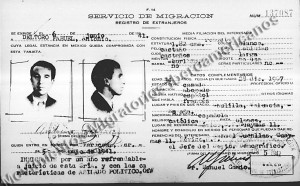Chulilla y los intelectuales exilados.
 Beyond the fact that a relevant space as an illustrious Chulillano is soon dedicated to him, trying to present his little-known work to his countrymen, these brief notes on the writer and poet Antonio Deltoro Fabuel serve to contrast the role of Chulilla and its people as an open town and cozy even in the most difficult situations.
Beyond the fact that a relevant space as an illustrious Chulillano is soon dedicated to him, trying to present his little-known work to his countrymen, these brief notes on the writer and poet Antonio Deltoro Fabuel serve to contrast the role of Chulilla and its people as an open town and cozy even in the most difficult situations.A man committed to his time, a friend of his friends and co-religionists, Antonio Deltoro’s chulillana house and his wife Ana Matilde Martínez Iborra were always open to many artists and intellectuals during the first 30 years before the military coup began and the civil war. Through Chulilla, strolling through its streets, observing the meanders of its river, getting lost in its mountains and marveling at its amazing places, important writers, painters, poets, and politicians spent years in the cultured Valencia of the 1930s: Manuel Altolaguirre, Max Aub, Juan Gil-Albert, Ramón Gaya, Manuela Ballester, Josep Renau, Guillermina Medrano (who was the first female councilor of the Valencia City Council), etc.etc.etc.
These chulillanas stays of the poet and his friends ended abruptly with the war, beginning the exile after a brief stay in Barcelona, first to Bordeaux (France), where Deltoro ended up in two concentration camps, St. Cyprien and Barcarés. As soon as the situation allowed it, both he and his wife crossed the puddle marching to Santo Domingo until the dictator Trujillo, in collusion with the Franco regime, went straight for them, having no choice but to go first to Mexico and then to the United States, exile from which they would not officially return until the transition years. We will talk again about the Chilean poet Antonio Deltoro Fabuel.
How collaborator of Josep Renau writes this little anecdote about the attempt to appoint Picasso director of the M; useo del Prado:
“The Prado Museum Directorate was vacant and as on other occasions, it could be occupied by any figurine in use, but the moment required something else. In a conversation with the then General Director of Fine Arts, José Renau, the name Picasso for the position came up. In other circumstances, the idea of offering the direction of the Museum to those who were so with their backs to everything official and so far away for years, physically and morally, from Spain would have seemed like an outrage. But Renau’s contagious enthusiasm prevailed and there was written a letter of probing to Picasso. Time passed, about a month, and when it was thought of a false exit came the emotional reply of Picasso accepting and unconditionally putting himself at the service of the government: he had never felt so Spanish and so sympathetic to the cause that was being aired “
Here you can read another little biography about Antonio Deltoro Fabuel
